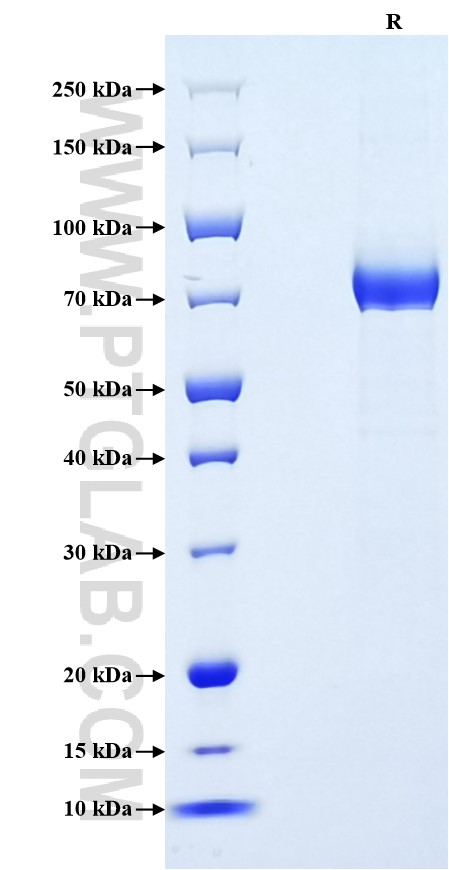Recombinant Human Galectin-9/LGALS9 protein (hFc Tag)
种属
Human
纯度
>90 %, SDS-PAGE
标签
hFc Tag
生物活性
未测试
验证数据展示
产品信息
| 纯度 | >90 %, SDS-PAGE |
| 内毒素 | <0.1 EU/μg protein, LAL method |
| 生物活性 |
Not tested |
| 来源 | HEK293-derived Human Galectin-9 protein Ala2-Thr323 (Accession# O00182-2) with a human IgG1 Fc tag at the N-terminus. |
| 基因ID | 3965 |
| 蛋白编号 | O00182-2 |
| 预测分子量 | 61.8 kDa |
| SDS-PAGE | 68-85 kDa, reducing (R) conditions |
| 组分 | Lyophilized from 0.22 μm filtered solution in PBS, pH 7.4. Normally 5% trehalose and 5% mannitol are added as protectants before lyophilization. |
| 复溶 | Briefly centrifuge the tube before opening. Reconstitute at 0.1-0.5 mg/mL in sterile water. |
| 储存条件 |
It is recommended that the protein be aliquoted for optimal storage. Avoid repeated freeze-thaw cycles.
|
| 运输条件 | The product is shipped at ambient temperature. Upon receipt, store it immediately at the recommended temperature. |
背景信息
The galectins, formerly known as S-type lectins, are a family of β-galactoside-binding proteins implicated in modulating cell-cell and cell-matrix interactions. Galectin-9 (LGALS9) is a tandem repeat-type member of the galectin family. It has three isoforms (named galectin-9L, galectin-9M, and galectin-9S): long type of 355 amino acids, medium type of 323 amino acids, and short type of 311 amino acids. Galectin-9 is ubiquitously expressed in a variety of tissues, including lymph nodes and spleen, and overexpressed in Hodgkin disease tissue. It is involved in chemoattraction, apoptosis, and the regulation of cell differentiation and has anti-allergic effects. It has been reported that galectin-9 is a ligand for Tim-3, through which galectin-9 can induce T-helper type 1 lymphocyte (Th1) death.
参考文献:
1. Barondes SH. et al. (1994) Cell. 25;76(4):597-8. 2. O Türeci. et al. (1997) J Biol Chem. 272(10):6416-22. 3. Zhang F. et al. (2009) Mol Biol Rep. 36(5):823-30. 4. Zhu C. et al. (2005) Nat Immunol. 6(12):1245-52.


